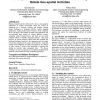Free Online Productivity Tools
i2Speak
i2Symbol
i2OCR
iTex2Img
iWeb2Print
iWeb2Shot
i2Type
iPdf2Split
iPdf2Merge
i2Bopomofo
i2Arabic
i2Style
i2Image
i2PDF
iLatex2Rtf
Sci2ools
114
click to vote
IUI
2006
ACM
2006
ACM
Activity-oriented context-aware adaptation assisting mobile geo-spatial activities
Human geospatial activities often involves the use of geographic information in mobile environment where the context of technology use is dynamic, complex, and unstable, creating unique challenges in designing effective mobile mapping applications. Enhancing the context awareness of the computing device can improve the usability of mobile map applications, but the potentially large number of contexts (physical context, computing context, human factors, and time) are not easily managed without a workable organizing structure. This paper proposes an activity-oriented context model that establish late (run-time) binding of contexts to the ongoning avtivity according to how they contribute to the success of the activity. Using this context model, adaptation of mobile map display to the changes of other contexts is based on the knowledge of ongoing task (within an activity) rather anticipated tasks. We discuss advantages of such an approach over traditional template-based model of context ...
| Added | 14 Jun 2010 |
| Updated | 14 Jun 2010 |
| Type | Conference |
| Year | 2006 |
| Where | IUI |
| Authors | Guoray Cai, Yinkun Xue |
Comments (0)

